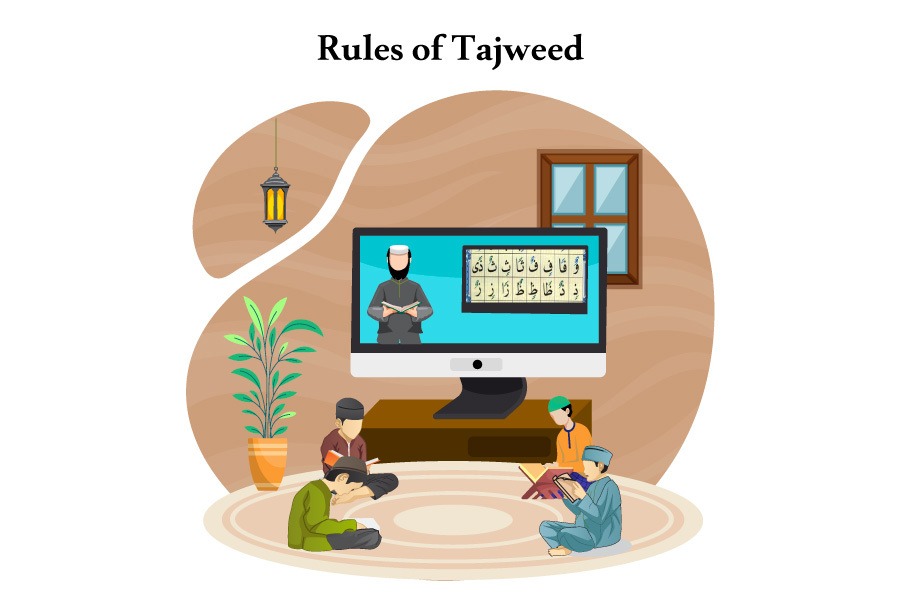When it comes to reciting the Quran, precision, and beauty play an integral role. Tajweed Rules is the art of proper pronunciation and articulation while reciting the holy Quran. It ensures that each word is pronounced accurately, preserving the eloquence and divine essence of the Quranic verses. In this article, we will explore the essential Tajweed rules that every Muslim should know to recite the Quran with proficiency and reverence.
What is Tajweed?
Tajweed is derived from the Arabic word “Jawwada,” meaning to make better or improve. In the context of Quranic recitation, Tajweed refers to the set of rules that govern the pronunciation and intonation of each letter, word, and verse. These Tajweed rules are vital for Muslims to adhere to while reciting the Quran to ensure that the divine message remains unchanged and its beauty intact.
Quran Tajweed Rules and Regulations
The correct application of Tajweed rules ensures that the reader recites the Quran with proper articulation, pronunciation, and rhythm. It is essential to honor the sacred nature of the Quran and to preserve its originality.
Here are some key Tajweed rules and guidelines:
-
Makharij al-Huroof (Points of Articulation):
Tajweed starts with learning the correct points of articulation for each Arabic letter. This involves knowing where the sound originates and how it travels in the mouth and throat.
-
Sifaat (Attributes of Letters):
Each letter has specific attributes, such as being heavy or light, prolonged or short, or having a specific type of sound. Understanding these attributes is crucial for accurate recitation.
-
Qalqalah (Vibration):
Certain letters have a slight vibration or “bounce” when pronounced. These letters are called the “letters of Qalqalah” and include ق، ط، ب، ج، and د.
-
Madd (Prolongation):
Some letters are elongated when reciting, either by extending the sound or counting extra counts. There are three types of Madd:
- Madd Asli (original)
- Madd Wajib Muttasil (connected obligatory)
- Madd Jaiz Munfasil (permissible disconnected)
-
Hamzatul Wasl and Hamzatul Qat’ (Hamzah):
Hamzah can be pronounced or silent, depending on its position within a word. Hamzatul Wasl is silent and connects two words, while Hamzatul Qat’ is pronounced when it appears at the beginning of a word.
-
Idgham (Assimilation):
When certain letters come together, they are pronounced as a single sound. Idgham can be done with or without ghunnah (nasalization).
-
Ikhfa (Concealment):
This rule applies to letters that are hidden or not pronounced clearly. The sound is softened and somewhat nasalized.
-
Izhar (Clarity):
Some letters are pronounced with clarity and distinctness without any assimilation or concealment.
-
Tajweed of the Hamzah:
Correctly pronouncing the Hamzah at the beginning or in the middle of a word.
-
Rules of Stopping (Waqf):
Knowing where to pause and stop when reciting the Quran is essential for proper understanding and expression.
The Development of Tajweed Rules
The rules of Tajweed evolved organically to ensure the accurate and beautiful recitation of the Quran, which is considered an essential part of Islamic worship.
During the time of Prophet Muhammad (peace be upon him), the Quran was primarily transmitted orally. The Prophet himself recited the Quran with Tajweed, and his companions learned from him directly. They paid careful attention to the way he recited and passed down this knowledge to their students and the subsequent generations.
As the Muslim community expanded, the need for preserving the proper recitation of the Quran became apparent. Scholars and experts in Quranic recitation (Qaris) started to compile the rules and guidelines for Tajweed to systematize the correct pronunciation and articulation of the Quranic text. They observed and documented the patterns of the Prophet’s recitation and analyzed the pronunciation of different letters and words in various contexts.
Over the centuries, Tajweed principles were refined and elaborated upon by renowned scholars and teachers of Quranic recitation. Different schools of Tajweed emerged, each with its own specific methodologies for reciting the Quran correctly. These schools were established in other regions and were influenced by the linguistic characteristics of the Arabic language in those areas.
One of the earliest scholars who made significant contributions to the field of Tajweed was Imam Abu al-Aswad al-Du’ali (d. 69 AH/688 CE). He is considered the first person to establish the rules of Tajweed systematically. His work laid the foundation for later developments in Tajweed. Other prominent scholars like Imam Al-Khalil ibn Ahmad (d. 170 AH/786 CE) and Imam Al-Farahidi (d. 175 AH/791 CE) made substantial contributions to Tajweed by formulating rules related to pronunciation and letters’ characteristics.
Throughout history, numerous scholars and experts in Quranic recitation continued to enrich the field of Tajweed with their research, commentaries, and annotations on the Quran. Their efforts aimed to preserve the Quran’s authenticity and promote its proper recitation within the Muslim community.
Importance of Tajweed Rules
Tajweed, the art of proper Quranic recitation, holds immense importance for Muslims as they approach the holy book of Islam. It goes beyond mere linguistic accuracy and becomes a crucial aspect of preserving the Quran’s originality and sanctity. Let’s delve into why Tajweed matters so much.
Tajweed’s rules reflect a deep reverence and love for the Quran. By following Tajweed rules, Muslims show their utmost respect for the divine words of Allah. The beauty and precision with which they recite the Quran demonstrate their recognition of its sacred nature and profound meaning.
Secondly, since the Quran was revealed in Arabic, Tajweed plays a vital role in maintaining its pristine pronunciation. Tajweed rules enhance the clarity and fluency of Quranic recitation. When Muslims recite with Tajweed rules, they can better understand and absorb the divine message. The emotions conveyed through proper recitation help them connect on a deeper level, allowing them to grasp the profound meanings and timeless teachings within the Quran.
By following the rules of Tajweed, they seek to emulate his beautiful way of reciting the Quran, establishing a deeper connection with the beloved Messenger of Allah. For Muslims, Tajweed also holds great significance during prayers. By adhering to Tajweed, they offer their worship to Allah with dignity and correctness. The devoted recitation adds sincerity and devotion to their acts of worship, creating a stronger bond with their Creator.
Tips to Improve Tajweed
Improving Tajweed requires dedication and consistency. Here are some tips to enhance your Quranic recitation:
-
Seek Guidance from a Qualified Teacher
Enroll in a Tajweed class or seek guidance from a qualified teacher who can provide personalized feedback and corrections. You can join Quran Institute or an Online Quran Classes platform i.e. AlQuranClasses. At AlQuranClasses, students will learn how to recite the Quran with Tajweed, mastering Arabic letters and basic Tajweed rules, including Noon Sakinah, Meem Sakinah, and Laam Sakinah. The course offers Arabic term explanations translated into English, providing a comprehensive learning experience. The course duration is flexible, allowing students to enroll for up to one year, during which they will receive dedicated instruction and ample practice opportunities to refine their Quranic recitation skills and deepen their connection with the sacred verses of the Quran.
-
Regular Practice
Regular practice is fundamental to mastering Tajweed rules for Quranic recitation. It is through consistent and dedicated practice that learners can internalize the principles of Tajweed and apply them effectively. Set aside time each day for recitation and self-evaluation.
-
Slow and Steady
Taking a slow and steady approach to learning Tajweed rules is highly beneficial. By pacing themselves, learners can thoroughly grasp the complexities of each rule and practice their application effectively. The gradual progression allows for better retention and understanding of the rules, reducing the risk of confusion or overwhelming feelings. Regular, consistent practice at a manageable pace helps learners internalize Tajweed principles, build confidence in their recitation, and develop a strong foundation for further advancement. Embracing a slow and steady learning process ensures a solid grasp of Tajweed, leading to a more eloquent and spiritually fulfilling recitation of the Quran.
-
Record Yourself
Recording yourself while practicing Tajweed rules can be a valuable learning tool. By listening to your own recitation, you gain a better understanding of your strengths and areas for improvement. The act of recording and then listening to your recitation helps you identify any mistakes or deviations from Tajweed rules, allowing you to make necessary corrections. It enhances your self-awareness and enables you to hear the nuances of proper pronunciation and articulation.
Conclusion
In conclusion, Tajweed Rules is not just a set of rules but a journey of love and devotion for Muslims. It instills a profound respect for the Quran, preserves its authenticity, and strengthens the spiritual connection with Allah. Tajweed is a reminder of the rich heritage passed down through generations and a means to follow the footsteps of Prophet Muhammad (peace be upon him). Learning and practicing Tajweed rules brings Muslims together in their pursuit of excellence in Quranic recitation and helps them find solace in the words of their Creator.
FAQs
- Is Tajweed mandatory for Quranic recitation?
While Tajweed is not obligatory, it is highly recommended for proper and beautiful Quranic recitation.
- Can I learn Tajweed online?
Yes, various Learn Quran online platforms, i.e., AlQuranClasses and Tajweed courses, are available for learning Tajweed.
- How long does it take to master Tajweed?
The time required to master Tajweed varies from person to person. With consistent practice, one can see significant improvement within a few months.
- Does Tajweed apply to the entire Quran?
Yes, Tajweed applies to the entire Quran, ensuring uniformity in its recitation.
- Can children learn Tajweed?
Yes, children can start learning Tajweed from an early age with the help of age-appropriate materials and guidance.

















